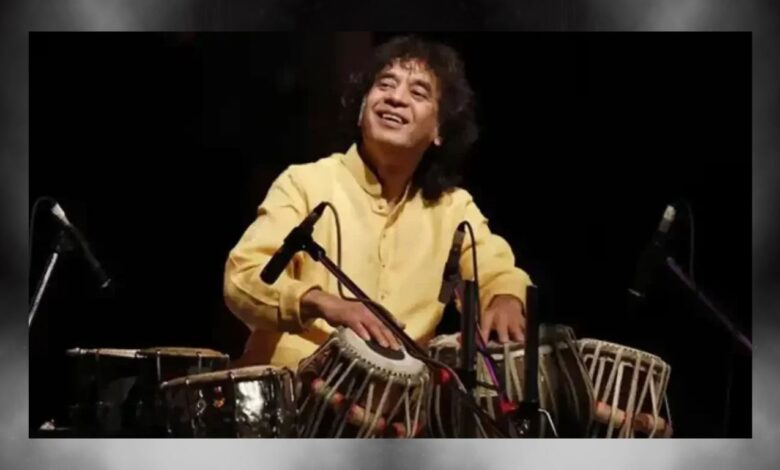Tabla Maestro Zakir Hussain (1951-2024) | Death from Idiopathic Pulmonary Fibrosis (IPF)

Tabla Maestro Zakir Hussain: Ustad Zakir Hussain’s 1990s television commercial for Brooke Bond Taj Mahal tea is often people’s first memory of him rather than a concert.
The death of five-time Grammy Award winner and tabla maestro Zakir Hussain in San Francisco on Sunday, from Idiopathic Pulmonary Fibrosis (IPF).
Idiopathic Pulmonary Fibrosis (IPF)
“It is a chronic, progressive lung disease characterized by scarring (fibrosis) of the lung tissue, leading to irreversible loss of lung function,” says Dr. Deepak Bhasin, Senior Director, Pulmonology, Critical Care, Max Hospital, Mohali. IPF is referred to as idiopathic because its precise cause is uncertain. The lungs become thicker and more rigid as a result of this scarring, which limits their capacity to expand and absorb oxygen. “IPF especially attacks the interstitium, the tissue surrounding the air sacs (alveoli), making it more difficult for oxygen to enter the bloodstream, in contrast to many other lung disorders. This eventually results in chronic dyspnea, exhaustion, and a diminished quality of life,” continues Dr. Mahavir Modi, a pulmonologist and sleep expert at the Ruby Hall Clinic in Pune.
Zakir Hussain “Wah Ustad nahi, wah Taj boliye”
For many, the first memory of the legend is not a concert but the 1990s television advertisement for Brooke Bond Taj Mahal tea. The ad was not just marketing gold but a part of the shared memory of an entire generation. We still remember the maestro with Taj Mahal as his backdrop and the magical words, “Wah Ustad nahi, wah Taj boliye”.
Life in Pictures
New Delhi: At the age of 73, Ustad Zakir Hussain passed away. The nation laments the ever smiling, wild-haired master whose attitude was as mesmerizing as the magic his hands wrought as the curtain closes on a six-decade journey that transformed the tabla from an accompaniment to an art form.
Ustad Zakir Hussain broke down all barriers during his lengthy career, including those related to religion, language, class, and nation. His tabla re-imagined the beats of Lord Shiva’s Damru and replicated the sound of rain. “Wah Ustad.” We disregarded his comments whenever his long, curling hair swung to the beats.
Idol of Zakir Hussain
Ustad Zakir Hussain stated in a 1998 interview with Simi Garewal that his mother, Bavi Begam, had not want for him to play the tabla. People did not consider music a viable career path when I was growing up. My mother had witnessed me attending concerts and returning with food that I had packed. That was it. She wished for a better life for me. She therefore made a concerted effort to ensure that I studied and concentrated on having a safety net,” he stated. The maestro claimed that his idol was his father, the renowned Ustad Alla Rakha.
According to the Ustad, he would frequently read letters asking his father to perform. “His son is adequate, but I would reply that he is not available. He is happy to come and play. When I got to the train station, they frequently walked right by me. Even though I occasionally wore school shorts, they were expecting someone older.
The maestro described a time when he wished to flee with a woman who worked for them. She was among the women who would take care of us. My mother must have been quite upset with me since she was attempting to stop me from performing music. Let’s simply flee, I told Pujaran. She sang occasionally. “You sing, I’ll play, and we’ll make a living,” I promised her. “I was prepared to leave after packing my school bags,” he stated. The maestro claimed that because “what I needed, my father, my teacher, was there,” he did not leave home.
Zakir Hussain Travel to the US
When asked why he chose to travel to the US at the age of 18, he replied, “I wanted to be a rock and roll star and I wanted to wear jeans.” Making a million bucks was my goal. With a boombox on my shoulder, I strolled through Bombay’s streets while listening to the Doors, the Beatles, and other artists. I believed it was the best course of action, earning a lot of money and being well-known very fast.
“But it was a whole different world when I arrived. I was making one batch of veggie curry, heating it up daily, and eating it with bread while subsisting on $25 per week. “Very difficult times,” he remarked. “I think that contribution of mine has happened because of two generations of hard work,” he stated in reference to his involvement in the transformation of the tabla from an accompaniment to an art form. The foundation was set when individuals like me showed up, and tabla musicians were no longer considered non-entities.
“First of all, Indian classical music was once a second-class profession,” he stated, reflecting on his trials. The tabla player was further lower on the rung in that second-class occupation. There were instances when you couldn’t even identify the tabla musician on the song. As an accompanist, I had to take considerably less, so I would have to give in even if I was playing with unknown artists and I was the one who was well-known.”
Also Read:
Self-Transformation, Self-Development, Process, Techniques
Edin Rose Bigg Boss18, Age, Career, Bigg Boss18 and Personal Life
Follow us on:
Click here to go to the Homepage
Keep Tuned with mojbuzz.com for more Entertainment
Note: Denial of accountability! MojBuzz.com is a computerized aggregator across the world of media. All of the content material can be found free on the Web. We have now simply organized it in a single platform for academic objectives solely. In every content material, the hyperlink to the first supply is specified. All emblems belong to their rightful homeowners, all supplies to their authors. If you’re the proprietor of the content material and are not looking for us to publish your supplies on our website, please contact us by e-mail – help@mojbuzz.com. The content material will probably be deleted within 24 hours.




